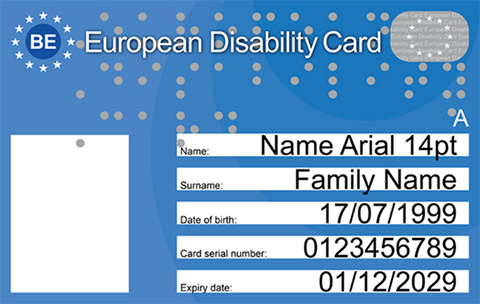European Commission delivers legislative proposal for EU Disability Card

What is the EU Disability Card?
On 6th September 2023, the European Commission delivered a much awaited legislative proposal for a Directive of the European Parliament and of the Council, to introduce a standardised European Disability Card and enhance the current European Parking Card for persons with disabilities. The Card aims to grant equal access to special conditions and preferential treatment in public and private services, including for instance transport, cultural events, museums, leisure and sport centres, or amusement parks. It will be issued by the relevant national authorities, complementarily to existing national certificates or cards. The improvements to the current European Parking Card foresee harmonising access to parking rights across Member States. This Card will be recognised throughout the EU, having a binding common format that will replace national parking cards for persons with disabilities.
How is it relevant for EASPD?
The lack of mutual recognition of disability status between EU Member States can cause challenges for persons with disabilities travelling in the EU. Both cards will reduce barriers to tourism and travelling for persons with disabilities, improving access to a fundamental pillar of the Schengen area agreements: freedom of movement. The Cards symbolise an increased commitment to European integration in the area of disability policy, in alignment with a major aspect of EASPD’s work: independent living.
The Commission has stressed the important role of service providers in informing persons with disabilities with whom they work about this new initiative’s conditions. Raising awareness can support persons with disabilities to be more aware of their rights, more confident in traveling abroad, and more empowered when they find themselves in a foreign context. Given that accessibility is a core precondition for inclusion, the Commission proposal is a promising improvement. and has the potential to yield concrete benefits in the years ahead.
Beyond this, although the proposal centres mainly on the areas of culture, leisure, sport and transport, social service providers may be impacted by it, especially with regards to the planning of EU travels for the people they support. On such occasions, the Disability Card can decrease costs and thus improve access to transnational and/or cultural activities of service providers traveling abroad with persons with disabilities.
What are the next steps?
It is important to note that the EU Disability Card will not yet be operational in 2023. The Commission’s proposal will now be discussed by the European Parliament and the Council, a negotiations’ process known as the ‘trilogues’. This stage can take years, and may result in changes to the characteristics of the Card. Once a final text is adopted, Member States will have 18 months to incorporate the provisions of the Directive into national law. In fact, a Directive is different from a Regulation: rather than a binding law, it is a legislative act that sets “goals” for EU countries which they need to “translate” to national law.
Background
This proposal builds on the outcomes of the EU Disability Card pilot project conducted between 2016 and 2018 in 8 countries: Belgium, Cyprus, Estonia, Finland, Italy, Malta, Romania, and Slovenia. The pilot initiative was financed under the Rights, Equality and Citizenship Programme 2014-20201 with the aim to promote the rights of persons with disabilities and to support the voluntary mutual recognition of the disability status. According to the 2021 study assessing the implementation of the pilot action, the Card proved to be an effective and beneficial project. Hence, under the 2021-2030 Strategy for the Rights of Persons with Disabilities, the Commission announced its eagerness to follow-up the initiative. This also contributes to the implementation of the UNCRPD (United Nations Convention on the Rights of Persons with Disabilities) by the EU.
A public consultation on the European Disability Card was open from February to May 2023 (for 12 weeks) to better account for the lived experience and real needs of persons with disabilities. The Commission collected over 3,300 replies, of which 78% from persons with disabilities (2,632 respondents), which were used to shape the current proposal.

